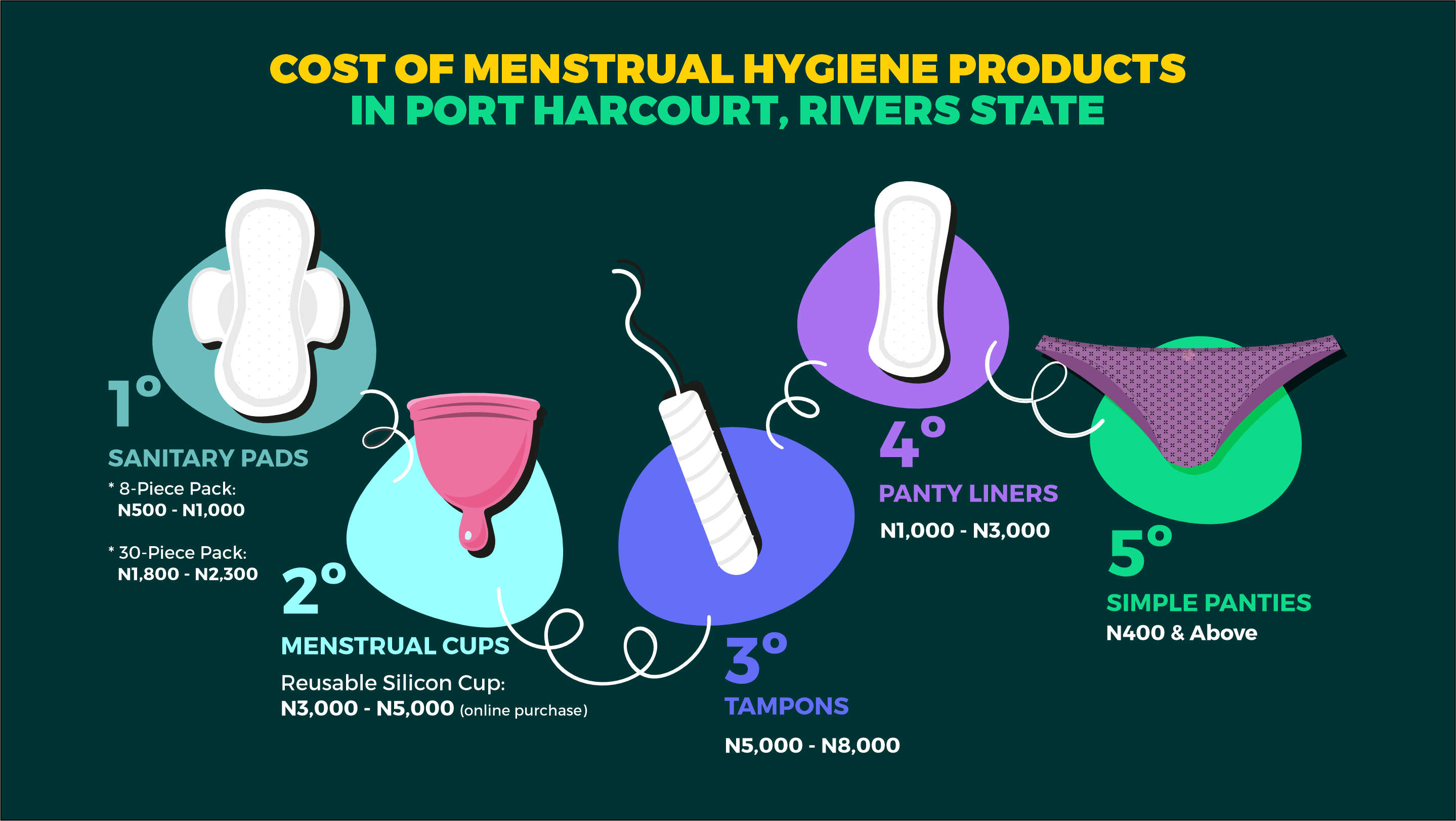
As the world marks Menstrual Hygiene Day, many girls and women in Nigeria still cannot afford menstrual hygiene products.
Some female residents of Rivers State like 27-year-old single mother, Ann, who lives in the Rumuosi area of the State, say they resort to alternatives like fabric pieces whenever they can’t afford a pack of sanitary pads. "I can use a wrapper. I can use a pad. If you use a wrapper if you do not keep it and the thing stays long, it will not do you anything, it's better than tissue sef, because people that use tissue, the tissue used to enter inside their private parts. If I see the thing is soaked, I will just remove it and change,” Ann said. Another resident of Port Harcourt, 29-year-old Blessing, who says she's currently unemployed, also uses pieces of wrapped cloth during her period. "As I no get money to buy pad, I use wrapper take do pad, when I use am finish, I wash am, when e dry I put am back," she said in Pidgin.
On their part, some secondary school girls in Port Harcourt say they have now become used to pieces of fabric because their parents cannot afford to buy them sanitary pads. “As there's no money, my mummy usually gives me materials, like fabrics, I am not used to the pads,” said 16-year-old Favour, an SS3 student. She also described the discomfort they face in school due to the lack of good and adequate toilets. "I don’t use the toilet, I am not comfortable with it, I cannot use it. It's not clean." Thirteen-year-old Boma says a junior Secondary School student also does not use the toilet in her school. “I don’t use the toilet o, I just go to one side outside. There was a particular time when my seatmate was stained, I took her outside and used my water to wash her off. She uses a pad but doesn't change it while in school because there’s no place to stay and change it,” she said. “The toilet in our school is clean, but they (school authority) do not normally allow us to enter because there’s no water to use," Boma added.
The school girls also say their little knowledge of the menstrual cycle was taught to them in their first year of secondary school, adding that they only get sanitary pads at the school principal's office on emergency requests.
"Our Home Economics teacher taught us in JSS1 but some people normally come and care for girls, I don’t know who they are but they come to share pads for girls," Boma said.
"Our Home Economics teacher taught us in JS1, but when I entered SS1, I did not hear anything about it, until some people came during International Girl Child Day," added Favour.
An elderly woman known as Mummy K says the age-long practice of using pieces of cloth in place of sanitary pads is unhygienic. She was lucky her parents were enlightened and provided her with pads in the 70’s. “During my own time, my parents were a little bit educated. I started seeing my period at the age of 13 years in the 70s. My mother bought me a sanitary pad which is not of the kind nowadays. The name is Comfit, it was blue colored. My mother said she used pieces of wrapper during her own time. Using that piece of cloth is not hygienic. She now said she will not use it on her own children."
In 2023, the then minister of women affairs Pauline Tallen said more than 37 million girls and women in Nigeria could not afford menstrual hygiene products, limiting their ability to study, work, and live their lives. A medical practitioner, Ann Imoru of the Clinical Pharmacists Association of Nigeria, agrees with her. Dr. Imoru, however, cautioned against using tissue paper as an alternative due to its potential hygiene and health risks. “It’s never safe to use other materials for menstruation, we have sanitary pads and tampons. It is not very common to use a silicone cup but that is also available. Some people use tissues which is not advisable at all. Don’t use it. Sanitary pad is mostly used because it is convenient and safe.”
Dr. Imoru is concerned about the poor hygiene habits of some females during their periods, which she says exposes them to some health issues. “Some people keep their pads for like eight hours, some even more. The blood is not something that you just expose your skin to, because now you’re exposing the old blood directly to your skin, to your vulva, that is the vagina opening at the same time. You have situations where some women go and sit in the toilets for a long time because they know that the flow is very heavy. They sit in the toilet to get them out of their system. That's very unhealthy,” she said. Dr. Imoru advised those who experience severe menstrual pain to seek proper medical care. She also advocated for free pads for underprivileged girls and women.
A lawyer and gender policy advocate, Debbie Effiong, wants the government, NGOs, and well-meaning individuals to make sanitary pads freely available for school girls. She says the lack of access to sanitary menstrual hygiene products forces girls to miss school, creating an unfair disadvantage. “When you go to the schools in the communities, you find the difficulty these girls face in being able to manage during menstruation, and most times they will tell you during menstruation they don’t go to school, not just because of the cramps, but because they have nothing to manage with.” She wonders why sanitary pads cannot be as free as condoms. “Sex is a choice, but menstruation is not a choice. So why should the girls be off school because of menstruation?” Mrs. Effiong is advocating investment in handmade reusable sanitary pads which school girls can also learn to make by themselves, to reduce period poverty. “It’s a simple sewing process with your needle and thread, there is a special type of absorbent and then with very clean clothing, they are glued and sewn together to form the shape of a pad. Now the beauty of these products is that they can be used for two years before you start thinking of changing,” she said.
Another medical practitioner, Ezinne Okpani, wants young girls to learn how to calculate their menstrual cycle. “The menstrual cycle begins the first day the menstruator sees her blood till the first day of the period the following month. A normal cycle is between 21 to 35 days, but the average menstrual cycle we have is 28 days. For some that have a 28-day cycle you are supposed to be ovulating on the 14th of your menstrual cycle, and you should be very careful at that time because ovulation means you are ready to get pregnant if you meet a man.”
A Nigeria Info survey shows that a pack of eight sanitary pads costs between N500 and N1,000, and a pack of 30 sells for N1,800 to N2,300. A reusable silicone menstrual cup, which is not readily available in Port Harcourt, can be bought online for N3,000 to N5,000, while, tampons cost between N5,000 and N8,000. A pack of panty liners costs between N1,000 and N3,000, and a piece of simple panties is sold for at least N400. Menstrual Hygiene Day is marked on 28 May yearly in line with the normal female 28-day menstrual cycle. The theme for this year is "Together for a Period-Friendly World."


